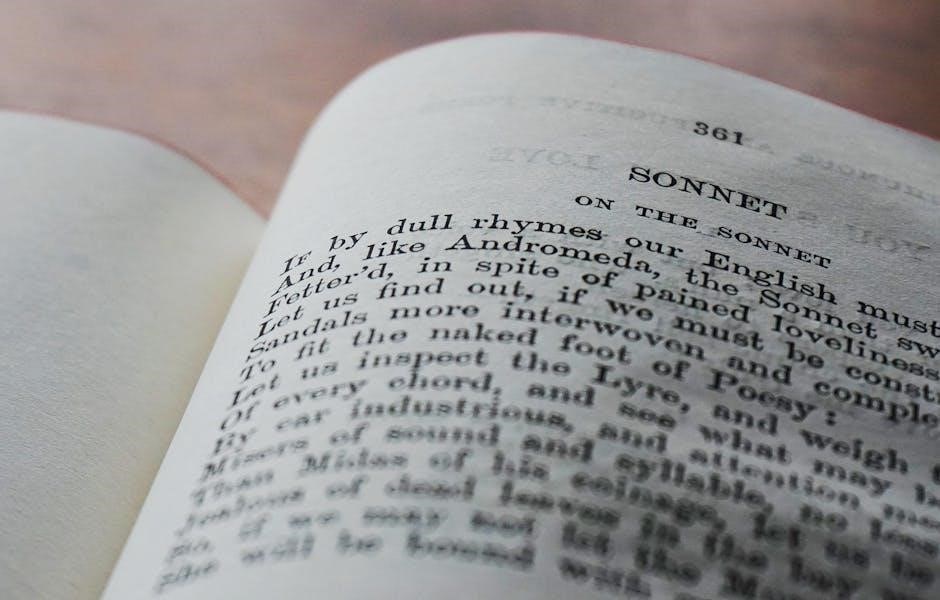Desiderata, a timeless poem by Max Ehrmann, offers wisdom on living peacefully amidst life’s chaos. Its gentle guidance on humility, kindness, and inner peace resonates universally, making it a cherished piece available in PDF format for easy access and reflection.
Meaning and Significance of the Poem
Desiderata, meaning “things desired,” is a poetic guide to living harmoniously, emphasizing peace, silence, and humility. Its timeless wisdom encourages balance and kindness in life’s journey.
2.1 Core Message of Desiderata
The core message of Desiderata revolves around finding inner peace and balance in a chaotic world. It emphasizes living gently, being humble, and treating others with kindness. The poem encourages embracing silence as a source of strength and avoiding unnecessary conflicts. It also highlights the importance of self-acceptance and not comparing oneself to others. By focusing on these principles, individuals can cultivate a more meaningful and fulfilling life. The poem’s central theme is about aligning oneself with the essence of peace and harmony, both within and around them. Its wisdom is universal, making it a timeless guide for all.
2.2 Relevance in Today’s World
Desiderata’s timeless wisdom remains highly relevant in today’s fast-paced, chaotic world. Its message of finding peace amidst noise and cultivating kindness resonates deeply in an era dominated by stress and digital distractions. The poem’s emphasis on humility, self-acceptance, and avoiding unnecessary conflicts offers a refreshing counterpoint to modern society’s tendencies toward comparison and competition. Its advice on staying grounded and treating others with compassion is particularly valuable in fostering mental well-being and meaningful relationships. As a result, Desiderata continues to inspire individuals seeking balance and harmony in their lives, making it a cherished resource for personal reflection and growth in contemporary times.
History and Origin of Desiderata
Desiderata, written by Max Ehrmann in 1927, was originally titled “Go Placidly Amid the Noise and Haste.” Its origins were later confused when mistakenly attributed to a church.
3.1 Original Composition by Max Ehrmann
Max Ehrmann, an American poet and lawyer, composed Desiderata in 1927. Initially titled “Go Placidly Amid the Noise and Haste,” it reflected his philosophical views on life. The poem emphasizes peace, humility, and kindness, offering timeless advice. Ehrmann’s work was deeply personal, drawing from his life experiences. The poem gained popularity posthumously, becoming a global inspiration. Its original manuscript was later copyrighted, ensuring its authenticity. Ehrmann’s intent was to leave a lasting, humble gift, which he achieved through this cherished piece.
3.2 Clarification of Authorship Confusion
Despite its widespread popularity, Desiderata faced authorship confusion for many years. Initially, it was mistakenly attributed to being a 17th-century poem from a church wall, but this claim was later debunked. The true author, Max Ehrmann, copyrighted the poem in 1927 under the title “Go Placidly Amid the Noise and Haste.” Ehrmann’s authorship was confirmed through his original manuscripts and diary entries, which revealed his intent to share timeless wisdom. This clarification has solidified Ehrmann’s rightful place as the creator of this beloved poem, ensuring his legacy endures through its continued relevance and inspiration to millions worldwide.

Availability in PDF Format
Desiderata is widely available in PDF format online, offering easy access to its timeless wisdom. Readers can download and print it conveniently for personal reflection or sharing.
4.1 Sources for Downloading the PDF
Multiple online platforms offer free PDF downloads of Desiderata, making it easily accessible. Websites like Printed Heron provide beautifully formatted versions, while others, such as the Museum of Cambridge, share the original text. Additionally, platforms like Pinterest and various inspirational blogs offer downloadable links. Many sites allow users to print the PDF for personal use or to share with others. Some versions include calligraphy or artistic designs, enhancing its visual appeal. The poem is also available in formats suitable for journaling or home decor, catering to diverse preferences. These sources ensure that the timeless wisdom of Desiderata is just a click away for anyone seeking inspiration.
4.2 Formatting Options for Readers
The Desiderata PDF is available in various formats to suit different preferences. Many versions feature clean, readable layouts, while others include artistic designs, calligraphy, or illustrations for visual appeal. Some PDFs are optimized for digital reading on devices like tablets and smartphones, ensuring clarity and ease of use. Additionally, printable versions allow readers to customize the display, such as adjusting font sizes or colors. Certain formats are specifically designed for journaling, offering space for personal reflections alongside the poem. This versatility ensures that readers can engage with the timeless wisdom of Desiderata in a way that aligns with their individual needs and preferences, enhancing their experience of the text.
Themes and Lessons from the Poem
The Desiderata emphasizes the importance of humility, kindness, and self-acceptance. It teaches the value of peace, silence, and understanding, offering timeless wisdom for a fulfilling life.
5.1 Emphasis on Peace and Silence
The Desiderata poem profoundly highlights the importance of maintaining inner peace and finding solace in silence. It encourages readers to embrace calm amidst life’s chaos, emphasizing that peace is not merely the absence of noise but a state of mind. The poem reminds us to seek tranquility by being present in the moment and avoiding unnecessary disturbances. This theme is central to the poem’s message, offering readers a gentle reminder to cultivate stillness in a world filled with noise and haste. By valuing silence, one can better navigate life’s challenges with grace and clarity.
5.2 Importance of Humility and Kindness
The Desiderata poem underscores the value of humility and kindness in fostering meaningful relationships and personal growth. It advises readers to interact with others compassionately, emphasizing the importance of treating everyone with respect, regardless of their background or perspectives. The poem encourages speaking one’s truth quietly and clearly, while also listening to others, even those who may seem dull or ignorant. This approach promotes harmony and understanding, urging individuals to avoid conflicts and instead embrace humility as a foundation for balanced living. By fostering kindness and humility, the poem guides readers toward creating a more peaceful and interconnected world, where empathy and grace prevail in everyday interactions.
5.3 Other Central Themes
Beyond peace and kindness, the Desiderata poem explores themes of self-acceptance, patience, and the pursuit of joy in simplicity. It encourages readers to embrace life’s journey with grace, avoiding unnecessary comparisons and competitions. The poem also emphasizes the importance of living with dignity, refraining from loudness, and finding contentment in one’s own path. Additionally, it highlights the value of hard work and the importance of not being deterred by criticism or failure. These themes collectively promote a balanced and fulfilling life, urging individuals to cultivate inner strength and resilience while remaining open to growth and learning. The poem’s holistic approach to life makes it a timeless guide for personal reflection and development.
Background of the Author, Max Ehrmann
Max Ehrmann was an American writer, poet, and lawyer, best known for his iconic poem Desiderata. Born in 1872 in Terre Haute, Indiana, Ehrmann initially pursued a career in law before dedicating himself to writing. His work often reflected his deep contemplation of life’s struggles and spirituality. Ehrmann composed Desiderata in 1927, drawing inspiration from his personal experiences and philosophical musings. Despite its later popularity, the poem gained widespread recognition only after his death in 1945. Ehrmann’s writings continue to inspire readers worldwide, offering timeless wisdom and solace through his thought-provoking words.
How to Download the Desiderata PDF
Downloading the Desiderata poem in PDF format is straightforward and accessible. Various websites, such as Printed Heron and Wikimedia Commons, offer free downloadable versions of the poem. Users can search for “Desiderata PDF” on their preferred search engine to find reliable sources. Once on a trusted site, simply locate the download link and save the file to your device. The PDF format ensures compatibility with most devices, allowing readers to enjoy the poem on computers, tablets, or smartphones. Additionally, the PDF can be printed for a physical copy or customized with formatting options like fonts and colors for a personalized reading experience.

Popularity and Global Reach
The Desiderata poem has gained immense popularity worldwide, transcending cultural and linguistic barriers. Its universal message of peace, humility, and kindness resonates with readers from diverse backgrounds. The poem’s global reach is evident in its widespread circulation and translations into multiple languages. Its availability in PDF format has further amplified its accessibility, allowing it to be shared and read by millions across the globe. The poem’s timeless wisdom has made it a favorite for personal reflection, inspiration, and even educational purposes. Its influence extends beyond literature, often being used in various contexts such as weddings, funerals, and motivational materials. This widespread adoption underscores its enduring relevance and appeal in modern society.

Cultural Impact and Influence
The Desiderata poem has left a profound mark on modern culture, inspiring countless individuals and communities. Its timeless wisdom has transcended generations, shaping perspectives on peace, humility, and kindness. The poem’s adaptability has led to its inclusion in various forms of media, from prints to digital formats like PDF, ensuring its message reaches a broad audience. It has been widely used in educational, spiritual, and motivational contexts, influencing personal growth and interpersonal relationships. The poem’s universal appeal is further evident in its integration into ceremonies, artworks, and literature. Its impact is also seen in its role as a source of comfort and guidance during challenging times, solidifying its place as a cultural treasure. Its enduring relevance continues to inspire new interpretations and applications across the globe.
Modern Uses of the Poem
The Desiderata poem remains a relevant and versatile piece in modern times, finding applications in personal and professional spheres. Many use it as a daily motivational tool, displaying it in homes or workplaces for inspiration. The availability of the PDF version has made it easy to share digitally, ensuring its message reaches a wider audience. Educators incorporate it into curricula to teach values like humility and kindness. Therapists and counselors often recommend it to clients seeking inner peace and balance. Additionally, the poem is widely used in mindfulness practices, retreats, and self-help programs. Its timeless wisdom continues to resonate, making it a cherished resource for personal growth and reflection in contemporary life.
Translations and Adaptations
The Desiderata poem has been translated into numerous languages, ensuring its universal message reaches diverse audiences. Its Latin origin, meaning “things desired,” has been preserved in translations like Spanish, French, and many others. Beyond language adaptations, the poem has been transformed into calligraphy prints, audiobook versions, and even illustrated editions. Some artists have paired its text with nature photography or abstract art, enhancing its emotional impact. Additionally, the poem has been set to music and performed in various compositions. These adaptations ensure the poem’s timeless wisdom remains accessible and engaging for modern readers, while its core message of peace and humility endures across cultures and formats.

Scholarly Analysis and Interpretations
Scholars have deeply analyzed Desiderata for its philosophical depth and timeless wisdom. The poem’s themes of peace, humility, and kindness are explored in academic literature, highlighting its relevance to modern existential questions. Researchers often focus on its structure, emphasizing how each stanza builds upon the last to create a holistic guide for living. The poem’s language, simplicity, and universality have led to its inclusion in studies on spirituality, psychology, and literature. Additionally, scholars have examined the poem’s historical context, tracing its evolution and the misconceptions surrounding its authorship. Its adaptability across cultures and its enduring popularity make it a subject of ongoing scholarly interest and interpretation.
Desiderata, a poem by Max Ehrmann, remains a timeless source of wisdom, offering guidance on living with grace, humility, and kindness. Its universal themes of peace, self-awareness, and compassion continue to resonate globally, transcending generations. The poem’s availability in PDF format has made it easily accessible, allowing readers to reflect on its profound message anytime. Scholars and readers alike appreciate its simplicity and depth, making it a cherished piece of literature. As a cultural phenomenon, Desiderata inspires personal growth and mindfulness, ensuring its relevance in an ever-changing world. Its enduring popularity is a testament to the power of Ehrmann’s words to uplift and guide humanity.